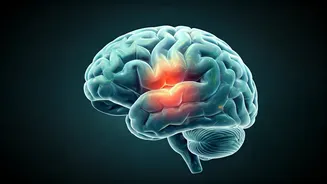Brain's Chemical Secrets
The brain's intricate chemical processes play a crucial role in regulating our emotional state, attention, and sleep patterns. Neurotransmitters such as
dopamine, serotonin, and norepinephrine are vital messengers. Dopamine is a key player in motivation, reward, and focus. Dysregulation of dopamine is frequently observed in ADHD, leading to challenges with attention, impulsivity, and hyperactivity. Serotonin and norepinephrine are strongly linked to mood and sleep. Imbalances in these neurotransmitters can contribute to anxiety and insomnia, creating a cascade effect where one condition exacerbates another. For instance, anxiety can deplete serotonin, disrupting sleep and further intensifying anxiety symptoms, showing the complexity and how these conditions often reinforce each other. Furthermore, brain imaging studies reveal structural and functional differences in the brains of individuals with these co-occurring conditions, highlighting the neurological basis and the necessity for tailored interventions that target brain chemistry for effective treatment.
When the Brain Won't
When the brain struggles to 'switch off,' the consequences can be significant, especially when dealing with ADHD, anxiety, and insomnia. This inability to quiet the mind is a hallmark of these conditions, often leading to a racing mind, persistent worries, and difficulty relaxing. In ADHD, this can manifest as a constant need for stimulation and an inability to focus. Anxiety amplifies these issues, causing a feeling of being on edge and preoccupied with potential threats. This mental overactivity drastically interferes with the ability to fall asleep and stay asleep, leading to insomnia. Sleep deprivation intensifies symptoms of both ADHD and anxiety, creating a vicious cycle of mental unrest and dysfunction. This interplay underscores the need for comprehensive strategies that target the different components of mental wellness, including cognitive therapies, medication, and lifestyle adjustments, to ease the mental turmoil and promote relaxation and improved sleep.
ADHD, Anxiety, Insomnia: Trio
Doctors often observe the frequent co-occurrence of ADHD, anxiety, and insomnia in the modern generation. This is due to a variety of factors, including the intricate relationship between brain chemistry and behavior. ADHD can predispose individuals to anxiety due to difficulties with organization, emotional regulation, and social interactions, causing them to worry about potential failures and criticism. Anxiety, in turn, can worsen ADHD symptoms, as worry and stress take away from the ability to focus. Insomnia further complicates matters, affecting cognitive function and emotional resilience, which then heightens both ADHD and anxiety. The shared neurological pathways and neurotransmitter systems underscore this connection, such as the involvement of dopamine, serotonin, and norepinephrine. Modern lifestyle factors like increased screen time and high-pressure environments may further complicate this triad. This highlights the need for integrated approaches to treatment.
Social Media's Spiral
Social media significantly contributes to the cycle of stress, anxiety, and sleep problems, particularly for Gen Z. The constant exposure to carefully curated content creates a sense of comparison and inadequacy, fueling anxiety. The constant stream of information and notifications keeps the brain in a state of hyperarousal, making it difficult to switch off and relax, and thus interfering with sleep. Furthermore, social media's addictive nature can lead to excessive use, consuming valuable time that could be dedicated to sleep or other relaxing activities. The blue light emitted from screens also disrupts the body's natural sleep-wake cycle by suppressing melatonin production. This blend of factors leads to a spiral effect where social media use contributes to anxiety, sleep disruption, and increased stress levels, creating a complex web. It's crucial to acknowledge this impact and create mindful habits around social media consumption to improve sleep and mental well-being.














